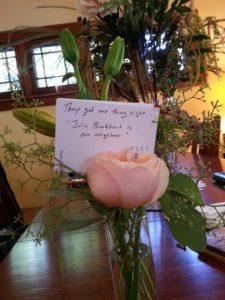We are in Day Six in this summer’s antiabortion grandstanding event. A small corps of antiabortion activists is in town, attempting to recreate the hysteria of 25 years ago, when thousands of them descended on Wichita. The goal, largely accomplished in 1991 but pretty much a bust this time around, was to disrupt and enrage a community that included three reproductive health care clinics providing abortion services, including a late-term clinic headed by Dr. George Tiller.
Julie Burkhart was there then, and she’s still around now, running South Wind Women’s Center, which she re-created, Phoenix-like, from the ashes of Tiller’s 2009 murder by a self-proclaimed “pro-life” activist. Burkhart is founder and CEO of Wichita’s Trust Women, a nonprofit organization that “opens clinics that provide abortion care in under-served communities so that all women can make their own decisions about their health care.” Burkhart splits her time between her home town and Oklahoma City, where she is managing the opening of a new clinic in that desert region—an apt term for those U.S. land swaths where politicians have stripped away reproductive rights using whatever back doors they can find to slip in past the inconvenient reality of constitutional law.
Although I consider Julie a friend, I know her primarily through her “gentle, angry” advocacy work (to quote one of my favorite First UU hymns). I am serving this week as a legal observer, hanging out inside her home to document any misbehavior by antiabortion activists outside of it. Friendly cops are parked outside, two to four among the corps that have bonded with Wichitans to ensure a stark difference between this summer and the one a quarter of a century ago. Their comrades are at the clinic, the home of its doctor, and Wichita’s Planned Parenthood headquarters, shoring up the troops. Pro-choice activists braver than I are serving as legal observers at these places, too, standing outside in the heat only a few feet from the interlopers.
My service is the cushiest. I sit inside a home with two big, friendly dogs and the typical overabundance of child’s framed drawings, photos, and poems to be found in any loving parent’s home. I’m at a wooden table surrounded by windows and sunlight. Each morning I am greeted by Julie’s husband, who passes me a handful of cherry tomatoes from his garden before heading out to work.
The table is plenty large, which is good, because it has gotten crowded. Early in the week, the antiabortion activists mass-mailed a flyer urging people to pray for their neighbor, an abortionist killing babies in Wichita’s abortion mill. (Its language is more purple than these words, but as a writer, I am not fond of employing flowery speech.)
The flyer provides Julie’s name, full address, and photo. The classic circular shooting target across her face is missing, because that particular tactic has gone out of style. (Antiabortion activists, it seems, don’t like going to jail.) But it was there in spirit, undeniably targeted to intimidate while hiding under the guise of doing the work of that ever-popular fella, Jesus Christ, for whom these people consider themselves spokespeople.
My first day here, I saw the flyer lying at the table’s end, like a bit of forgotten mail. But during my next visit, a neighbor turned up with a vase of flowers from her garden. Tucked among them was a “card”—the flyer, folded in half and flourishing a dashed-off note: “They got one part right: Julie Burkhart is our neighbor.”
Today, on my third visit, the vase has had to make way for other items. The owner of a local spa and salon has left her neighbor a coupon for a free treatment. Clipped to the coupon are several free samples of hair products. Next to that gift is somebody else’s handwritten card. The card apologizes to Julie for what she’s being put through. Its writer thanks her—as hundreds before her have, and as hundreds more will continue to do—for fighting for women’s rights to determine how to treat their own bodies.
I don’t think the card’s address is in Julie’s immediate neighborhood. The circle is spreading.
There’s one more item on the table today. A bundle of keys. They are to Julie’s home, left for the legal observers coming and going today. Julie couldn’t stick around until the 7:30 a.m. shift arrived. She had work to do, and no time to waste for those who would try to stand in her way.

